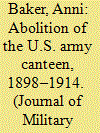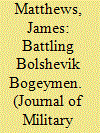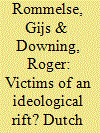|
|
|
Sort Order |
|
|
|
Items / Page
|
|
|
|
|
|
|
| Srl | Item |
| 1 |
ID:
146805


|
|
|
|
|
| Contents |
In the 1880s, the U.S. Army established on-post canteens as a way of curbing excessive drinking in off-post taverns. Army officers supported the canteen concept, but when large numbers of citizen volunteers entered the army in 1898, the temperance movement, particularly the Women's Christian Temperance Union (WCTU), successfully advocated for the canteen’s abolition. The ensuing public debate revealed contesting popular images of soldiers: innocent boys or adult men. The canteen debate focused the attention of Progressive Era activists on moral and social conditions in the army, and engendered a long debate over the role of the army in American society.
|
|
|
|
|
|
|
|
|
|
|
|
|
|
|
|
| 2 |
ID:
146806


|
|
|
|
|
| Contents |
By placing the anti-Bolshevik reaction in Spain in 1917-1923 in a transnational context, this article adds nuance to a Europe-wide analysis of the era’s counter-revolutionary movements by including a prominent First World War neutral. It also questions the prominent “brutalization” thesis that links postwar violence to trench warfare and military defeat. This cannot explain the widespread and violent social unrest that gripped Spain after 1917. But, rather than reject the war and brutalization thesis entirely, this article contends that the Russian Revolution should be seen as part of a “Greater War” that affected all countries, whether they were formally belligerents or not.
|
|
|
|
|
|
|
|
|
|
|
|
|
|
|
|
| 3 |
ID:
146808


|
|
|
|
|
| Contents |
The American historian Edward Mead Earle has until recently escaped the attention of historians of war, although his edited volume of 1943, Makers of Modern Strategy: Military Thought from Machiavelli to Hitler, was a seminal work in the field, widely read by military historians. Whilst recent scholarship has sought to situate Earle as a key figure in the pre–Second World War development of American security studies, this article emphasizes Earle’s role as a historian compiling a volume which was distinctly historical in approach, tone, and scope. His plans for a revised second edition never came to fruition, so Makers remained an unfinished work.
|
|
|
|
|
|
|
|
|
|
|
|
|
|
|
|
| 4 |
ID:
146809


|
|
|
|
|
| Contents |
The German summer offensive against the Soviet Union in 1942, Case Blue, is one of the most famous campaigns in history thanks to the Battle of Stalingrad. Although historians agree that the offensive’s aim was control of the Caucasian oilfields, there is a widespread misconception that Baku was the main objective. German ambitions were in fact rather modest—the primary objectives were the smaller and more accessible oilfields of Maikop and Grozny. The Germans were also just as determined to deny the Soviets access to Caucasian oil by severing transit along the Volga as they were to secure the oil for themselves.
|
|
|
|
|
|
|
|
|
|
|
|
|
|
|
|
| 5 |
ID:
146804


|
|
|
|
|
| Contents |
The article examines the military participation of Germans in early modern colonialism, focusing on their service to colonial trading companies and colonial powers. It shows that the German colonial empire had a long pre-history, since German mercenaries provided a vital “tool of empire” for European colonial powers. The article argues that the extensive participation of German soldiers in early modern colonialism demonstrates a hybridity in European colonialism in that national colonial empires relied on trans-national European human resources in addition to local manpower. The article examines German soldiers’ identification with their colonial employers and shows that soldiers recruited as a group retained a stronger sense of separate identity.
|
|
|
|
|
|
|
|
|
|
|
|
|
|
|
|
| 6 |
ID:
146807


|
|
|
|
|
| Contents |
The conventional wisdom holds that Spain took only a limited interest in armored warfare until the European powers that intervened in the Spanish Civil War of 1936-39, Nazi Germany, Fascist Italy, and the USSR, demonstrated its importance on the battlefield. The author, tapping into the previously ignored professional military literature in Spain, reveals that, to the contrary, officers in the Spanish army early on took a lively interest in armor, an interest fed not only by what they knew of developments elsewhere in Europe but by the possibility of using tanks and other armored vehicles to advantage in Spain’s colonial wars in Morocco. It was not so much lack of interest that retarded Spanish development of armored units as lack of funds. Over the interwar years, upwards of 50 percent of the Spanish military budget was spent on personnel, particularly the army’s bloated officer corps.
|
|
|
|
|
|
|
|
|
|
|
|
|
|
|
|
| 7 |
ID:
146803


|
|
|
|
|
| Contents |
Dutch prisoners from the sea battles of the First Anglo-Dutch War of 1652–1654 were held in England under generally inhumane conditions. It has recently become accepted that ideological differences, as much as commercial, led to the deterioration in relations that led to the conflict. English public opinion had been inflamed by a vicious anti-Dutch propaganda campaign, suggesting that ideological demonization could provide the explanation for the dire treatment to which the prisoners were subjected. It is concluded, however, that logistical problems associated with their reception, plus the chronic lack of money of Cromwell’s regime, provide a sufficient explanation.
|
|
|
|
|
|
|
|
|
|
|
|
|
|
|
|
|
|
|
|
|